The summer break from classes offers college students an opportunity to learn more about their fields of interest, gain practical experiences and create connections that may lead to job offers after graduation.
Case Western Reserve students are using this time to explore roles as diverse as wilderness therapy in Colorado to research for the League of Women Voters in Washington, D.C. to collecting DNA sequences in a campus biology lab.
In recognition of National Intern Day today, July 27—a date established by WayUp in 2017—we’re highlighting the internships some of our students are enjoying this summer.
Pallavi Goculdas
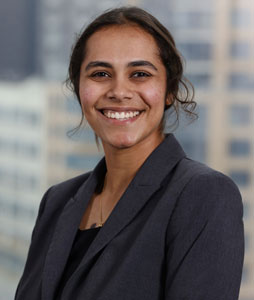
Weatherhead School of Management
JPMorgan Chase & Co. in New York City
Pallavi Goculdas could picture herself living in “The Big Apple” next year after graduation. The rising fourth-year student has had the opportunity to call New York City her home the last two summers and has enjoyed being there.
“It’s been fun exploring different parts of the city with my friends,” she said.
Goculdas—a double major in finance and business information technology with minors in applied data science and economics—said she’s always held an interest at the intersection of finance and technology. This summer, she has been able to further explore those areas as an asset management product summer analyst on the alternatives growth equity team at JPMorgan Chase & Co.
For her internship, Goculdas contributes to research and presentations for upcoming funds, builds Tableau dashboards to generate insights on prospective limited partners, performs deal diligence on potential investments and more.
“It’s been an amazing experience so far,” she said. “I’m learning a lot while making meaningful contributions to the team.”
Goculdas was originally hired by JPMorgan Chase & Co. last summer as part of the Girls Who Invest Summer Intensive Scholar Program.
She was thrilled to return to a company whose culture she describes as collaborative and inclusive, as she’s been able to work alongside and receive mentorship from leaders in the company.
“Senior executives are always willing to chat with interns and help us learn and grow,” Goculdas said.
Looking ahead to her final year as an undergraduate, Goculdas is excited to be a mentor to new students as captain of the Case Western Reserve women’s tennis team, in her leadership roles for Forté Rising Stars and The Weatherhad Fund, and as a member of Alpha Kappa Psi.
Upon graduation, Goculdas hopes to return to “the city that never sleeps.”
Jada Kleinholz
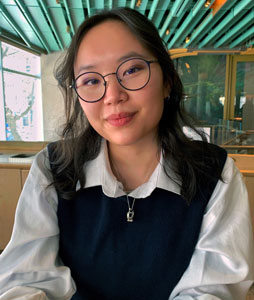
Case School of Engineering
Bristol Myers Squibb in Devens, Massachusetts
Jada Kleinholz was in elementary school when her interest for science and engineering piqued. Her parents, an engineer and a chemist, were eager to support her passions and sent her to STEM-related summer camps at the first opportunity.
Now, the rising fourth-year chemical engineering student is spending the summer and fall semesters in the Technology Transfer Engineering Co-Op at Bristol Myers Squibb—a multinational, Fortune 500 pharmaceutical company in Massachusetts. There, she is gaining real-world, hands-on experience, and learning new concepts. Some of her most notable lessons have been focused on preventing contamination, including getting trained in ISO 7 gowning so she is familiar with how to properly enter a cleanroom.
“The amount of time and effort put into preventing contamination in every part of the process is beyond what I even imagined,” she shared.
When Kleinholz came to Case Western Reserve University she knew she wanted to pursue a career in the medical industry, but practicing medicine wasn’t exactly for her. Through the co-op at Bristol Myers Squibb, she gets to do both.
“This role gives me the opportunity to help save the lives of real people, while using my own interests and expertise,” she said.
In addition to the new knowledge and hands-on experiences, Kleinholz has enjoyed meeting with the other co-op and intern students, hearing about their roles and backgrounds, and learning from her more senior leaders. With five months left in the program, she is eager to discover even more, while building strong relationships.
“I am absorbing as much information about anything and everything as I can,” she said.
When she returns to campus in the spring, Kleinholz will finish her coursework and start her search for a job in industry, knowing the technical and communication skills she’s learned this summer will be extremely valuable.
Emilia Kunickas
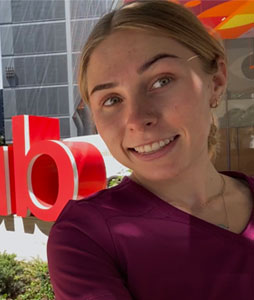
Frances Payne Bolton School of Nursing
Shirley Ryan AbilityLab in Chicago
Emilia Kunickas is still adjusting to working several 12-hour shifts each week for her summer internship at Shirley Ryan AbilityLab in Chicago.
The second-year Bachelor of Science in Nursing student spends those hours alternating working as a patient care technician and shadowing senior nurses as a nurse intern.
Kunickas said she is thankful for her experiences at Frances Payne Bolton School of Nursing—especially the opportunity to begin clinicals during her first year—which helped her become more comfortable and familiar with a hospital setting. She has been able to help provide feeding tubes and catheterizations to patients, procedures she learned in the classroom and simulation labs at Case Western Reserve.
As the top-ranked rehabilitation hospital in the United States according to U.S. News & World Report, the AbilityLab is home to medical professionals who focus on physical medicine and translational research. Specifically, they work with adults and children who have severe and complex conditions such as amputations, traumatic brain injuries and cancer-related impairments.
It’s the translational research that has opened Kunickas’ eyes to the importance of collaboration and how different perspectives can benefit a patient’s care.
“At Shirley Ryan, nurses work very closely with physical, occupational and speech therapists, as well as other clinicians and even technology scientists. Each week we do rounds together and we discuss what strengths and weaknesses we see in patients from different specialities,” she said. “This collaboration helps keep everybody on the same page and give updated goals for the patients, with the goal of getting them healthy again and discharged.
“This opportunity gives me the perfect balance of being able to provide direct patient care that’s within my current scope of practice while allowing me to gain valuable insight on what my future career might look like in other ways,” she continued. “Plus, I didn’t know much about rehabilitation nursing and this internship has opened my eyes to this field.”
Seth Rose
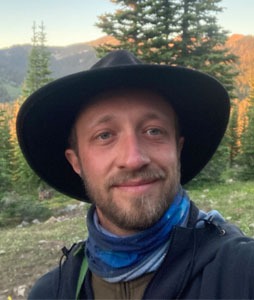
Mandel School
Open Sky Wilderness Therapy and Restorative Solutions, both in Colorado
When considering how he’d spend his summer, Seth Rose found two opportunities related to his interests in counseling, community mediation and culture building. He is alternating work in two-week increments as a wilderness therapist high up in the Colorado Rocky Mountains with an internship focused on restorative justice education.
Now in his fourth summer with Open Sky Wilderness Therapy, Rose leads “off-the-grid” adventures to help adolescent and young adult clients who are struggling with various life circumstances to grow and heal by building awareness and self-esteem through mindfulness, improved communication skills and dynamic therapeutic interventions. A goal is to help students identify their values and learn to make choices that reflect their own values rather than those imposed externally.
“As a guide, I reflect to them how their current behaviors may or may not align with these values and impact others,” Rose said. “The work is rooted in mutual respect and understanding and it creates a powerful process in rewiring narratives, unconscious behaviors and communication skills.”
Rose is balancing that role with an internship at Restorative Solutions, an organization that develops restorative justice curriculum and training for universities looking to establish a “culture of care” which places high importance on relationships within the institution and systems of justice.
“Community is seen as the foundation of justice and thus restorative justice circles include mentors, elders, teachers, friends, victims and perpetrators,” he said. “I am helping to lay out a strategic framework and process for colleges by adapting the curriculum and language currently aimed at educators and administrators toward accommodating social workers.”
When Rose returns to campus in August, he said he is looking forward to continuing his work through an internship with the Cuyahoga County Fatherhood Initiative—a program that encourages fathers to maintain an active role in raising their children—before graduating in May.
“I hope to further develop and apply my learning of the structure and architecture of rites of passage and intergenerational community development within an intercultural urban setting,” he said.
Sarah Tibbitts
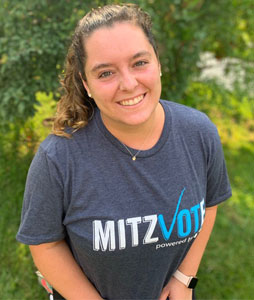
School of Law
League of Women Voters of the United States in Washington, D.C.
Rising second-year law student Sarah Tibbitts is spending her summer working as a legal intern for the League of Women Voters United States, a nonpartisan, nonprofit national organization that works to protect and expand voting access through advocacy, litigation and education.
As a member of the litigation team, Tibbitts is attending meetings with partner organizations, assisting with legal research, creating social media content about ongoing litigation and conducting research for the League’s issue areas.
“Thus far in my internship, I’ve been surprised by how much I use civil procedure—knowing the various steps involved in the development of a trial has been helpful,” Tibbitts said. “I’ve really enjoyed getting to spend time at a nonprofit that focuses on voting rights and voter access.”
When she’s back on campus at Case Western Reserve, Tibbitts is involved in several student organizations. She serves as president of the Student Public Interest Law Fellowship—a group that provides scholarships for law students pursuing otherwise-unpaid public interest internships—and is the community engagement chair of the Jewish Law Student Association, which brings Jewish law students together for celebrations of religious holidays, mixers and speakers around issues of anti-semitism and human rights. Tibbitts is also involved with Law Students for Reproductive Freedom, serving as the social media chair.
“Each of these organizations is incredibly important to me and my law school experience,” she shared.
Tibbitts is pursuing a career in public interest law, aiming to work either as an attorney at a social justice-oriented nonprofit or as a public defender. She is also taking this summer as an opportunity to explore our nation’s capital.
“Washington, D.C., is a city that I have spent time in before and really enjoy,” she said. “It’s a great place for young people, especially for someone interested in public policy and social justice. I would love to return to D.C. after law school!”
Alex Zou
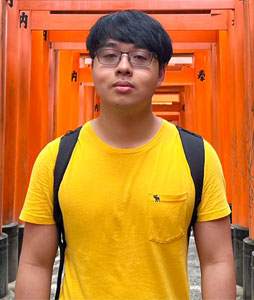
College of Arts and Sciences
Ward Lab at Case Western Reserve University
Second-year student Alex Zou took a proactive approach toward figuring out his summer plans. Given his interest in biochemistry, he was looking for an opportunity that would allow him to use the skills he has been learning at the College of Arts and Sciences.
“After taking a couple of biology courses, I was interested in research in that area,” said Zou. “I approached Associate Professor Rob Ward to see how I could learn more and he asked me if I would be interested in an internship this summer on his genome annotation of DNA sequences project.”
Ward asked Zou if he could assemble a team of students to participate; once Zou was able to recruit several peers, the summer internship took shape.
Representing the Ward Lab at Case Western Reserve, Zou and his peers on the project are focusing on collecting DNA sequences from bacteriophages that infect Azotobacter vinelandii—a large, beneficial bacteria occurring in soil and sewage that, when engineered, can provide crops with the right amount of ammonia without producing excess amounts that can pollute lakes and oceans. Bacteriophages are viruses that infect and replicate only in bacterial cells and are the most abundant biological agent on earth.
“The genome sequences came back recently and we are gearing up to start analyzing them,” said Zou. “I look forward to doing some gene annotation along with coordinating with the team.”
The DNA data the team collects will determine the function of the coded proteins.
“We’ll use the Phage Evidence Collection And Annotation Network database along with previous bacteriophage entries for assistance,” he said.
Once the annotation is complete, Ward plans to submit the findings for peer review.
For students looking for research opportunities, especially those who are just starting their university experience, Zou said “they should be open to talking to professors and consider asking how to extend their learnings from the classes that they’re interested in.”
He also shared that students who want to have a similar experience should prepare ahead.
“Apply for research opportunities months in advance and plan time accordingly,” he said.
